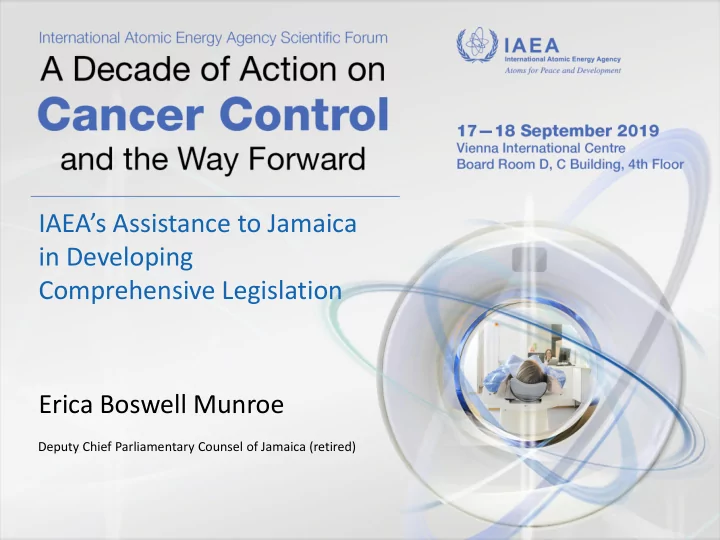

IAEA’s Assistance to Jamaica in Developing Comprehensive Legislation Erica Boswell Munroe Deputy Chief Parliamentary Counsel of Jamaica (retired)
The Need • In Jamaica, 56% of deaths in Jamaica are attributable to non-communicable diseases (NCDs). 20% of which are due to cancer. In 2013, US $170 million was spent to treat NCDs. The country is facing mounting financial challenges that underline the importance of strategic planning to maximize investments made in cancer control.
Background • Jamaica joined the IAEA in 1965. • Jamaica has signed a second five-year IAEA Country Programme Framework (CPF) for 2018 to 2023. • Jamaica is an active participant in IAEA activities and benefitted from the knowledge and training offered by the IAEA
IAEA’s Response to the Need • The IAEA has been pivotal in advancing Jamaica’s capacity to fight against cancer in Jamaica by offering wide-ranging and ground breaking assistance in the areas of research & training, the re-establishment of a nuclear medicine centre and legislation, including facilitating the passage of the Nuclear Safety and Radiation Protection Act in 2015
Impact Review • From 4 to 8 March 2013, responding to a request from the Minister of Health, the IAEA's Programme of Action for Cancer Therapy (PACT) sent a team of cancer control experts to conduct an in-depth assessment of the country's cancer control capacity and needs.
Impact Review (2) • The team comprised several experts, whose area of focus spanned the cancer control continuum, including cancer information, prevention, early detection, diagnosis and treatment (including radiology, nuclear medicine and radiation oncology) and palliative care.
Nuclear Safety and Radiation Protection Act • The IAEA's support has also enabled the passage of the Nuclear Safety and Radiation Protection Act, 2015 to, among other things, provide safeguards from exposure to ionising radiation and monitor facilities utilising ionising radiation and nuclear technology; and facilitate Jamaica's compliance with international obligations.
Nuclear Safety and Radiation Protection Act • The Act establishes a national regulatory body called the Hazardous Substances Regulatory Authority to, among other things, grant authorisations, establish operational standards, regulate and monitor activities, practices and facilities utilising ionising radiation and nuclear technology.
Nuclear Medicine Centre • The medical physics department at the University of the West Indies (UWI), which trains nuclear physicists across the LAC region, was expanded under an IAEA project. • Jamaica's effort to fight cancer received a major boost with the investment of more than $250 million into the re-establishment of a Nuclear Medicine Centre at the University Hospital of the West Indies (UHWI).
Nuclear Medicine Centre (2) • The centre is now being retrofitted and is expected to be open early 2020. The project is a massive undertaking which has seen officials of the UHWI, the University of the West Indies, the Planning Institute of Jamaica (PIOJ) and the Ministry of Health working with the IAEA to create what will be the only nuclear medicine facility in the public sector. The IAEA has contributed €783,600 to the cause.
Nuclear Medicine Centre (3) • The IAEA has purchased the machine that will be used at the facility and has funded the training of those who will provide technical expertise. • The IAEA has trained a nuclear pharmacist, a nuclear medical physicists and nuclear technicians to operate the machine.
Conclusion • The IAEA has trained Jamaicans, reviewed the legislation offered technical assistance, donated money. The Government and people of Jamaica are grateful to the IAEA. • The IAEA as usual has been nurturing and diligent in advancing cancer care in Jamaica.
Recommend
More recommend